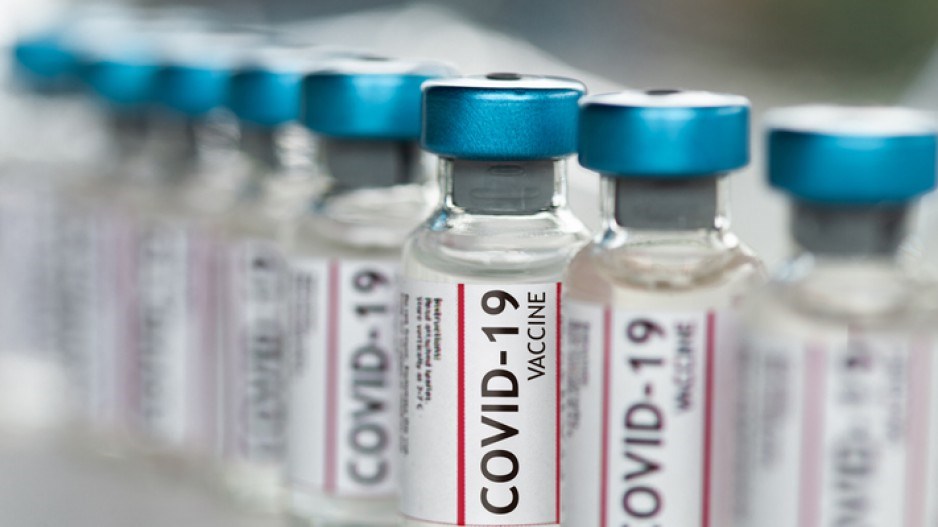As Canadians await word on when COVID-19 vaccine distribution will begin within their borders, those celebrating Christmas this year might find stockings stuffed with envy while observing rollouts in other nations.
Canada does not have any manufacturing capacity for the mRNA vaccines – a new technology for vaccine development – that have been garnering recent attention for their high rates of efficacy.
So should British Columbians and other Canadians temper expectations of an economic rebound against other countries that will begin vaccinating sooner?
“I’m a bit of an optimist now,” said Ken Peacock, chief economist for the Business Council of BC.
His opinion on the potential for economic recovery has been shifting mostly over the past month as economic data has shown a sharp uptick in growth after initial lockdowns in the spring.
Statistics Canada data released December 1 revealed record annualized GDP growth of 40.5% during the third quarter, and October employment numbers show the national unemployment rate has fallen to 8.9% from the 2020 high of 13.7% back in May.
But Peacock said much of his optimism is not necessarily for 2021, but for 2022-24 , when vaccines are expected to be in wide distribution across Canada.
Ottawa has secured or is in the midst of securing 429 million vaccine doses from seven companies.
For the country with a population of 38 million, it may look like overkill but Prime Minister Justin Trudeau has said it was a measure meant to mitigate potential logistical problems if some vaccines don’t work out.
The feds began locking down those deals in August, when a joint Canada-China vaccine collaboration collapsed.
That left other countries in a better position to secure agreements with the U.S. set to vaccinate as many as 20 million Americans in December.
Public Services and Procurement Minister Anita Anand told reporters this month Canada’s “delivery window” for vaccines is by the end of 2021’s first quarter.
That would give the U.S. and other countries with prioritized access to a vaccine a potential multi-month head start on reopening their economies on a wider scale than Canada.
But there’s a solid chance Canada won’t be trailing those other countries in terms of an economic rebound, according to Peacock.
“The stimulus is really significant – it really is,” he said, referring to the federal government’s $381 billion deficit and plans to deliver as much as $100 billion in more spending over three years.
Peacock said whatever advantage other countries with better access to vaccines would likely be mitigated by the fact Canada is spending more per-capita to keep the economy afloat.
He also noted that the way vaccine distribution is likely to be staggered in different countries – frontline workers first, then the most vulnerable and so on down the line – that the advantage other countries may initially have over Canada may ultimately be somewhat negligible.
Economists at CIBC now peg B.C.’s real GDP growth in 2021 at 4.1% after an estimated 5.4% decline this year.
That’s above national growth projections of 4.4% next year after an estimated decline of 5.5% in 2021.
But an economic rebound won’t be evenly distributed across sectors.
CIBC senior economist Andrew Grantham noted in a November 24 outlook that B.C. has a much greater reliance on the tourism and hospitality industry than Canada as a whole.
“Even though inter-region travel has been allowed, the deep pockets of Chinese and U.S. travellers have been missed by hotels and restaurants in the area. While a vaccine or, at the least, faster COVID-19 tests by mid-2021, could see a rebound in domestic travel next year, a big return of those international visitors is likely a 2022 story,” he said.
RBC economist Colin Guldimann said in a note he expects government supports, outlined in a fiscal update presented November 30 by federal Finance Minister Chrystia Freeland, to target transportation, tourism and the energy sectors as they “are likely to continue feeling a squeeze even after a vaccine is widely distributed.”
But are other industries at risk of losing a competitive advantage if vaccination distribution lags behind in Canada?
Since film and TV productions began slowly resuming in B.C. over the summer, the province has benefited from some Hollywood projects moving north where the pandemic is under better control.
Service work for foreign productions accounted for $2.82 billion out of the $3.4 billion of B.C. film and TV production volume generated during the 2018-19 fiscal year, according to the Canadian Media Producer Association’s Profile 2019 report.
And Peacock said he doesn’t see B.C.’s edge in the film and TV sector dissipating even if a vaccine is widely distributed in competing American jurisdictions.
“We just have so much momentum, and capacity, and the same time zone [as Los Angeles]. People just like this location,” he said.
“We might just come out the other side of this in reasonably good shape.” •




